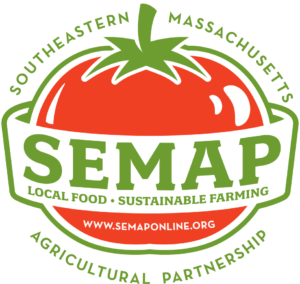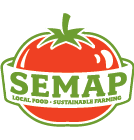
This page will serve as a working equity statement prepared in consultation with SEMAP staff, board members, and outside organizations. This is a living document, and as we better understand ways we can improve equity in our agricultural community, it will change to reflect our learning. We encourage feedback at info@semaponline.org or anonymously through this form.
Draft 2: Published 7/12/2022
In 2021, SEMAP began to investigate the intersection of food, farming and racial justice, and reflect on the ways our work has fallen short in addressing these issues in the past and present.
We found what has long been apparent to many: deliberate decisions by the US government and its agencies have provided inequitable benefits for white farmers. Accumulation of benefits and regionally inconsistent access and representation continue to widen these injustices. We have a responsibility to better understand the ways we can disrupt these intentional inequities, and to help create a more equitable food system in our region. As a white-led organization that has previously not centered equity in our work, we must be explicit and transparent about how we are approaching our commitments to social justice.
Statement
Southeastern Massachusetts Agricultural Partnership is committed to economic, environmental, racial and social justice for all people involved in Southeastern Massachusetts’ agricultural system, especially those most impacted by historic and present-day systemic oppression. We appreciate that this is an ongoing process and understand this statement to be a living document. We welcome feedback from community members at info@semaponline.org or anonymously via this form.
Truths
- Current Southeastern Massachusetts agriculture is built on unceded Massachusett, Wampanoag, Pokanoket, Nipmuc, Pawtucket, Nahaganset, and Narragansett lands** through human exploitation, slave labor, and co-opted knowledge.
- Modern agriculture has created and perpetuated the exploitation of labor and ecosystems, the loss of ancestral knowledge and community connection to food systems, land theft and forced migration**, and inequitable and insecure access to food, each of which disproportionately impacts Black, Indigenous and people of color (BIPOC). [See our reason for using this term in the Resources section below]
- In agricultural systems, social and political structures are reinforced** by white supremacy, anti-blackness, xenophobia, colonization, anti-immigrant bias, and extractive capitalism.
- Despite these intentional and extreme inequities, our local food system includes vibrant, strong, and resilient farmers, farmworkers, and communities of color.
Commitments
- We commit to identifying, understanding, and repairing the past and current harms, regardless of intent or lack thereof, of SEMAP’s work.
- We commit to holding ourselves accountable through ongoing learning about and engagement in justice work at all levels of our organization, including our board of directors, staff, membership, and the broader community of eaters and growers in Southeastern Massachusetts.
- We commit to centering marginalized voices — including Black, Indigenous and people of color (BIPOC); lesbian, gay, bisexual, transgender, queer (LGBTQ+); immigrant; low-income; veteran; and female voices — when designing and implementing programs.
- We commit to prioritizing land access for BIPOC farmers, who are and have been systemically excluded from land, financing, and resources.
- We commit to advocating for policies that support equitable access to local food and opportunities to farm, especially for BIPOC community members.
- We commit to learning from, supporting, and collaborating as equal partners with the many individuals, tribes, and organizations in our region who have been advancing equity in local food systems.
Actions
- Appropriately compensating BIPOC presenters, consultants, and experts for the added labor of presenting or consulting in a space that doesn’t reflect the true diversity of our communities.
- Consulting with and compensating individuals and organizations who excel in reaching diverse audiences to adapt our outreach strategies, in order to better welcome, serve, and engage under-resourced communities and BIPOC program participants.
- Continuing staff and board education on the intricacies of diversity, equity & inclusion through formal trainings, independent study, and monthly meetings, at a minimum.
- Reducing barriers to participation in SEMAP programming by offering scholarships, diversifying workshop leadership, and investigating translation needs.
- Recognizing and amplifying the work of BIPOC-led organizations in the local agriculture space.
- Investing time, resources, and money to expand capacity and build momentum in diverse communities that are engaged in food access & local agriculture promotion work.
- Acknowledging the historical and ongoing contributions of BIPOC producers to agriculture and sustainability, in addition to resisting & confronting the white-washing that occurs in these sectors.
- Becoming more vocal advocates for BIPOC farmers, farmworkers, and community members in all of our state and federal legislative work.
- Developing a strategic plan for the next 3-5 years that will center racial equity in SEMAP’s mission and values.
- Sharing this equity statement with our community, board, and membership, reflecting on all feedback received, developing our understanding of the needs & challenges of this work, and modifying our commitment where necessary.
Resources
- This document and work was inspired in part by the work of other organizations in our regional agriculture sector, including the Maine Organic Farmers and Gardeners Association and NOFA Mass.
- We are following the lead of The BIPOC Project in our decision to use the term BIPOC. While we understand that this term doesn’t reflect the complete diversity of our community, and that no single term ever could, we appreciate its ability to specifically call out anti-Blackness and Indigenous invisibility, features of white supremacy which we believe underscore all issues of inequity. We will use this term only where generalizations are necessary and, where possible, opt instead for more specific terms to describe the Southeastern Massachusetts community.
- https://native-land.ca/ – a map of pre-colonial America, which shows the locations and lands of Indigenous tribes. This tool is a great way to begin understanding who has historically lived on this land, and recognize that American history is one of land theft and genocide of native people
- An Annotated Bibliography on Structural Racism Present in the U.S. Food System – a comprehensive list of books, journals, podcasts, films, and more that illustrate racism in our nation’s food system. Please note that we are working our way through this bibliography and have not yet viewed every resource in this document.
- “Globalization and NAFTA Caused Migration from Mexico,” Political Research Associates – for context on American agriculture’s connection to global farming and other geopolitical issues, including the deliberate construction of a migrant working underclass
- Woodwell Climate Research career statement
This page will serve as a working equity statement prepared in consultation with SEMAP staff, board members, and outside organizations. This is a living document, and as we better understand ways we can improve equity in our agricultural community, it will change to reflect our learning.
Any community members who wish to provide feedback on our work, and recommendations on places where we can grow and potential blind spots we may still hold are encouraged to reach out to info@semaponline.org or anonymously through this form.
See Previous Drafts of our working Equity Statement below:
Draft 1: 2/27/2022 – Prepared for the 2022 Ag and Food Conference
Steps We’re Taking Now:
-
- The SEMAP Team took part in an immersive 2-day training generously hosted by The Groundwater Institute in May 2022. We look forward to reflecting on these learnings and revising the above statement accordingly. If you have suggestions for trainings or resources that we should pursue, please get in touch!
- We implemented an equity-based compensation structure for our event speakers at our 2022 Ag & Food Conference in February. Because of SEMAP’s current engagement, we anticipated BIPOC speakers would be presenting to a largely white audience, and performing corresponding emotional labor. To account for this, BIPOC presenters were offered a double stipend for their participation (total of $125 for a 1 hour workshop), as well as advertisement for their business or organization in our program. All speakers were also offered 4 free admission tickets to the conference. We will continue this practice going forward.
[br]
